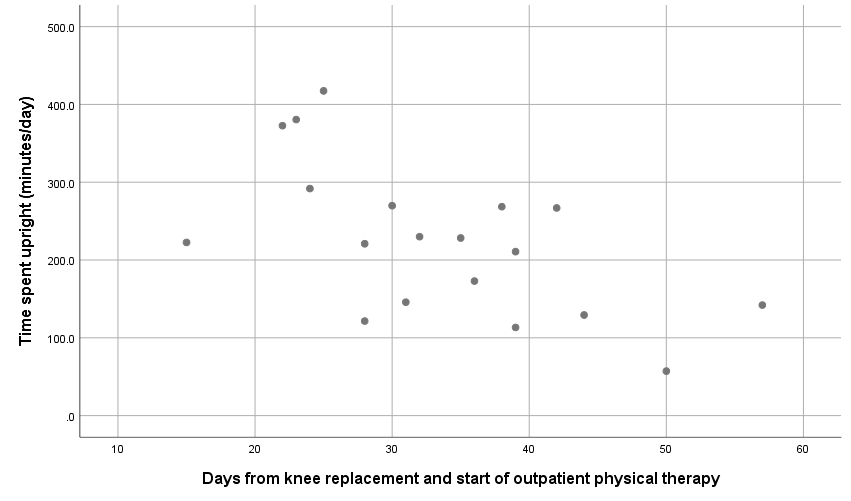Session Information
Date: Tuesday, November 12, 2019
Title: Orthopedics, Low Back Pain, & Rehabilitation Poster – ACR/ARP
Session Type: Poster Session (Tuesday)
Session Time: 9:00AM-11:00AM
Background/Purpose: After knee replacement, patients often receive physical therapy in-home or at a rehabilitation facility shortly after surgery and then transition to outpatient physical therapy. Physical activity is typically limited at this time, but little is known about how much time is spent upright prior to the start of outpatient therapy. The purpose of this study was to determine whether the timing of outpatient physical therapy is associated with objectively-measured steps and upright time following knee replacement.
Methods: Adults 40-80 years were recruited at the first outpatient physical therapy visit following total knee replacement. Participants completed an online survey assessing demographics, a brief medical and surgical history, and wore an activPAL monitor for 7 days. The activPAL monitor assessed the number of steps/day and average minutes/day spent upright, standing, and stepping. Only valid days consisting of 24 hours of wear time were used for analyses. Linear regression, adjusting for age and body mass index (BMI) was used to determine whether the start of outpatient physical therapy was predictive of steps/day, upright, standing, or stepping time.
Results: Participants (n=19) were 63.2% female, 57.9% white, with an average age of 63.0±7.4 years and body mass index of 32.8±6.2 kg/m2. Participants started outpatient physical therapy 33.6±10.3 days from surgery. On average, participants had 5.6±1.4 valid days of activPAL monitor wear. Over a 24 hour day, participants spent 224.3±97.1 minutes upright, with 160.0±30.7 minutes/day of that time standing and 64.3±30.7 minutes/day stepping. Participants took 4083.7±2038.5 steps/day. The start of outpatient physical therapy, adjusting for age and BMI, significantly predicted the time spent upright (F(3,15) = 3.46, P< 0.05, R2 = 0.41) (Figure 1) and stepping (F(3,15) = 3.45, P< 0.05, R2 = 0.41). The start of outpatient physical therapy, age, and BMI did not statistically predict the time spent standing (F(3,15) = 3.07, P=0.06, R2 = 0.38) and number of steps/day (F(3,15) = 2.76, P=0.08, R2 = 0.36).
Conclusion: The timing of the start of outpatient physical therapy predicts the number of steps/day and time spent upright in patients after knee replacement. Specifically, starting outpatient therapy sooner from surgery was associated with greater steps and time spent upright. Physical therapists may want to consider the timing of starting outpatient physical therapy in developing personalized activity plans especially among those who started late and take fewer steps/day and spent less time upright.
To cite this abstract in AMA style:
Pellegrini C, Mook N, DeVivo K, Brown D. Early Start of Outpatient Physical Therapy After Knee Replacement Is Associated with More Objectively-measured Steps and Time Spent Upright [abstract]. Arthritis Rheumatol. 2019; 71 (suppl 10). https://acrabstracts.org/abstract/early-start-of-outpatient-physical-therapy-after-knee-replacement-is-associated-with-more-objectively-measured-steps-and-time-spent-upright/. Accessed .« Back to 2019 ACR/ARP Annual Meeting
ACR Meeting Abstracts - https://acrabstracts.org/abstract/early-start-of-outpatient-physical-therapy-after-knee-replacement-is-associated-with-more-objectively-measured-steps-and-time-spent-upright/

